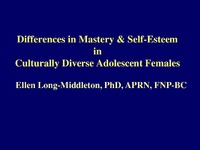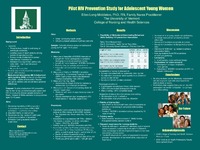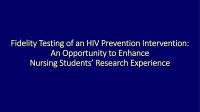Differences in mastery and self-esteem in culturally diverse adolescent females
View File(s)
Visitor Statistics
Visits vs Downloads
Visitors - World Map
Top Visiting Countries
| Country | Visits |
|---|
Top Visiting Cities
| City | Visits |
|---|
Visits (last 6 months)
Downloads (last 6 months)
Popular Works for Long-Middleton, Ellen R. by View
| Title | Page Views |
|---|
Popular Works for Long-Middleton, Ellen R. by Download
| Title | Downloads |
|---|
View Citations
Citations
Purpose: Mastery, a global sense of control over one's life, and self-esteem, the value placed on oneself, are psychological characteristics associated with numerous health-enhancing behaviors. Developing interventions to fortify and enhance an individual's sense of mastery and self-esteem may serve to promote health-enhancing behaviors. Yet, differences in mastery and self-esteem among individuals of diverse cultures are not well understood, nor are the ways in which mastery and self-esteem impact health-enhancing behaviors. This is particularly so in adolescent females. Hence, the purpose of this investigation was to determine if differences existed in mastery and self-esteem levels in diverse cultural groups of adolescent females.
Methods: As part of cross-sectional, correlational study investigating predictors of HIV risk reduction behaviors, Pearlin Mastery Scale and Rosenberg Self-Esteem Scale scores among black, Latina and white adolescent females were examined to determine if significant differences existed across groups. A purposive sample of 224 black, Latina, and white adolescent females was recruited from an urban adolescent primary care setting. Analysis of variance was utilized to determine if significant differences existed across cultural groups.
Results: Black participants had significantly higher mastery scores than the Latina participants. Black participants had significantly higher self-esteem scores than both Latina and white participants. No significant differences in HIV risk reduction behavior scores existed among the three cultural groups.
Implications for practice: A better understanding of cultural differences in mastery and self-esteem in this group of adolescent females may serve to guide the development of interventions to promote health-enhancing behaviors associated with mastery and self-esteem in culturally-diverse groups of adolescent females.
Items submitted to a conference/event were evaluated/peer-reviewed at the time of abstract submission to the event. No other peer-review was provided prior to submission to the Henderson Repository.
| Type | Presentation |
| Acquisition | Proxy-submission |
| Review Type | Abstract Review Only: Reviewed by Event Host |
| Format | Text-based Document |
| Evidence Level | N/A |
| Research Approach | N/A |
| Keywords | Self-Esteem; Health-Enhancing Behaviors; Adolescent Females |
All rights reserved by the author(s) and/or publisher(s) listed in this item record unless relinquished in whole or part by a rights notation or a Creative Commons License present in this item record.
All permission requests should be directed accordingly and not to the Sigma Repository.
All submitting authors or publishers have affirmed that when using material in their work where they do not own copyright, they have obtained permission of the copyright holder prior to submission and the rights holder has been acknowledged as necessary.
Related items
Showing items related by title, author, creator and subjects.
-
HIV risk reduction behaviors in adolescent females: The influence of mastery and self-esteem
Long-Middleton, Ellen R. (2001-11-10)AIDS is a leading cause of death in adolescent and young adult populations. Heterosexual transmission of HIV is the fastest growing mode of infection among women, and minority populations are affected disproportionately. ... -
HIV risk reduction behaviors in adolescent females; The influence of mastery and self-esteem
Long-Middleton, Ellen R. (10/27/2011)Purpose. The purpose of the study was to test the moderator effect of mastery on the relationship between self-esteem and HIV risk reduction behaviors. Aims. The aims of this study were to: 1) examine the relationships ... -
Pilot HIV prevention study for adolescent young women
Long-Middleton, Ellen R. (2016-07-13)Session presented on Thursday, July 21, 2016 and Friday, July 22, 2016: Purpose: Human Immunodeficiency Virus (HIV)/Acquired Immunodeficiency Syndrome (AIDS) is a threat to the lives, health and well being of individuals ... -
Fidelity testing of an HIV prevention intervention: An opportunity to enhance nursing students’ research experience
Long-Middleton, Ellen R. (2018-04-03)The training needs of health care providers delivering an HIV prevention intervention were determined by incorporating graduate nursing students into fidelity testing of the behavioral intervention. Training needs were ... -
Perspectives of people living with HIV toward healthcare providers: Insights into multicultural health literacy
Long-Middleton, Ellen R.; Nicholas, Patrice Kenneally; Corless, Inge B.; Portillo, Carmen J.; Webel, Allison R.; Rivero-Mendez, Marta; Holzemer, William L.; Mogobe, Keitshokile Dintle; Kemppainen, Jeanne; Nokes, Kathleen M.; Cuca, Yvette; Reid, Paula; Eller, Lucille Sanzero; Wantland, Dean; Sabone, Motshedisi Boitumelo; Solis-Baez, Solymar; Gakumo, C. Ann; Fortinsky, Rachel; Dawson-Rose, Carol (2017-07-05)Purpose: To further our understanding about relationship influences that impact health literacy, the purpose of this study was to characterize the perspectives of a culturally diverse group of people living with HIV ...





